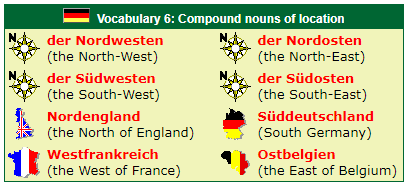German seasons
The names of the German seasons are all masculine in German, with the exception of "das Frühjahr", which is one of the words for "spring". The word for a season is "die Jahreszeit (-en)", which literally means "the time of the year":

Points of the compass
Similarly, the points of the compass are all masculine in German. To say "in the north etc.". In practice, you also precede each of the compass points by "im" - "im Norden", "im Westen", "im Süden", "im Osten".

When used as the first element in compound nouns however, the points of the compass dro the final "-en". Any compound noun thus formed will always take the gender of the final element of the compound.


Notes on the compass
1. When wind directions are given in weather forecasts, the shorter forms of the points of the compass tend to be used:
Schwacher Wind aus Nordost
(= A light wind from the north-east)
Starker Wind aus West bis Südwest
(= A strong wind from the west to the south-west)
2. If you wish to describe what the temperature is in the middle of a country, you should say "in der Mitte". The element "Mittel-" in a compound geographical noun is used to indicate centrality:
Mittelamerika (= Central America)
Mitteleuropa (= Central Europe)
 英语
英语 日语
日语 韩语
韩语 法语
法语 西班牙语
西班牙语 意大利语
意大利语 阿拉伯语
阿拉伯语 葡萄牙语
葡萄牙语 越南语
越南语 俄语
俄语 芬兰语
芬兰语 泰语
泰语 丹麦语
丹麦语 对外汉语
对外汉语

